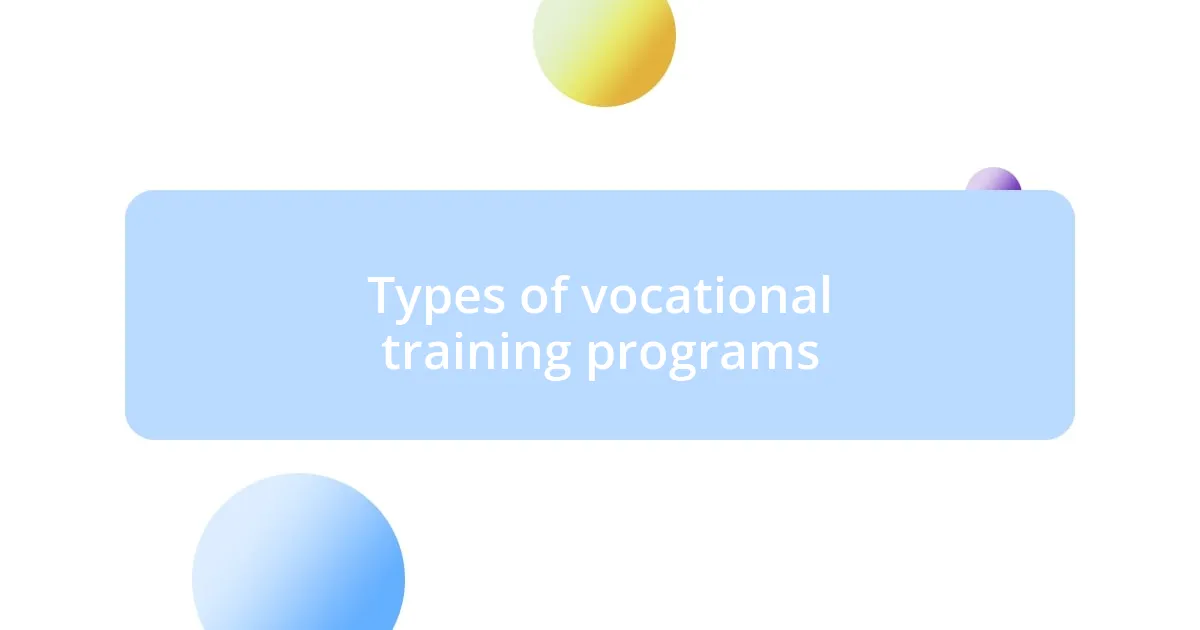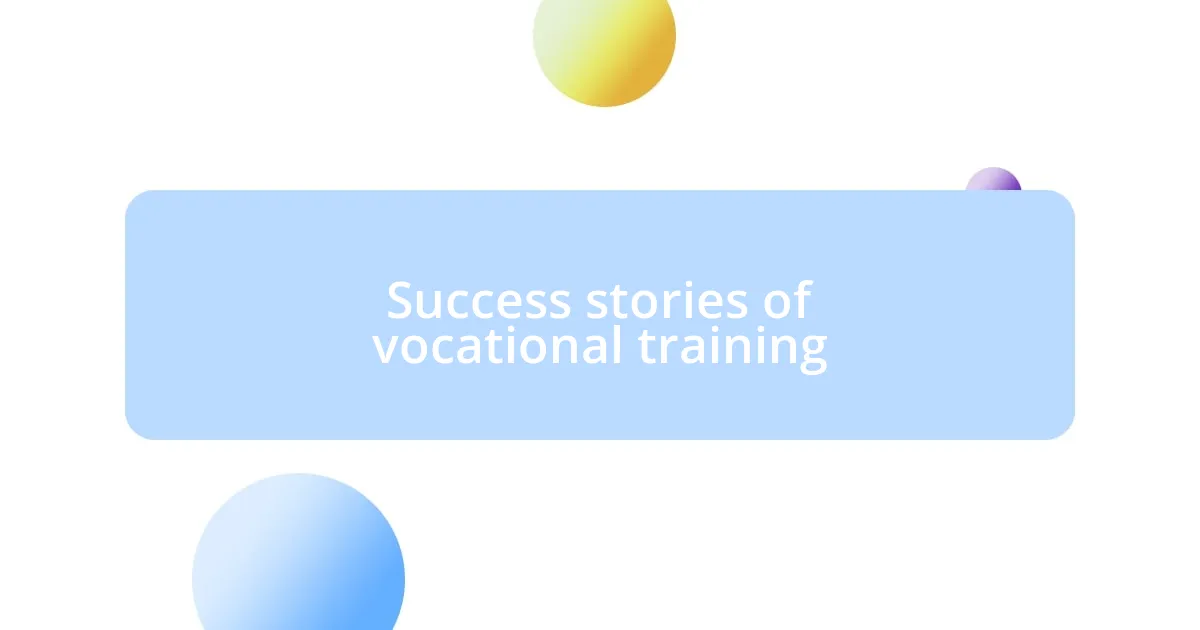Key takeaways:
- Vocational training enhances employability by providing marketable skills tailored to employer needs, often leading to immediate job opportunities.
- Various types of vocational programs, including technical education, apprenticeships, and certification courses, offer unique pathways for skill development and career advancement.
- Choosing the right vocational path involves reflecting on personal interests, job market demand, learning styles, earning potential, and preferred work environments.
- Future trends in vocational training include technology integration, a focus on soft skills, and global partnerships that enrich students’ learning experiences.

Understanding vocational training benefits
Vocational training offers a practically instant boost to employability. I recall meeting a young woman at a local career fair who had just completed a certificate in culinary arts. She was beaming with pride, having secured a job as a sous chef before even finishing her program. Isn’t it amazing how focused training can lead to immediate job opportunities?
These programs also allow individuals to learn specific, marketable skills tailored to the needs of employers. Personally, I’ve seen friends shift from dead-end jobs to fulfilling careers after enrolling in training programs for fields like HVAC or plumbing. This transformation not only enhances their financial stability but also gives them a renewed sense of purpose. Don’t you think having a clear career path can ignite one’s passion for work?
Moreover, vocational training is often more affordable and shorter in duration compared to traditional college degrees. I remember the relief I felt when I discovered that a few months in a trade school could lead to a lucrative career. It made me wonder why more people don’t explore these options when they can achieve their goals without accumulating massive student debt. Wouldn’t you agree that financial freedom is a significant advantage worth considering?

Types of vocational training programs
Vocational training programs come in various forms, each tailored to different career paths. For instance, technical education programs focus on fields like computer science or information technology, equipping students with the technical skills needed for specific jobs. I remember my cousin taking a six-month coding boot camp, which transformed his career from retail to software development. It’s incredible how targeted training can reshape one’s future!
Another type includes apprenticeship programs that combine on-the-job training with classroom instruction, particularly in skilled trades. My neighbor completed an electrician apprenticeship and often shares how the hands-on experience not only prepared him for the real world but also allowed him to earn while he learned. This blend of work and study can be particularly appealing for those who thrive in practical environments.
Lastly, certification programs provide specialized skills in various fields, such as healthcare, beauty, or mechanics. These courses typically last a few weeks to a few months and can lead directly to employment. I once met someone who earned a phlebotomy certification in just eight weeks, and their excitement about landing a job in a hospital right after was contagious. Each of these options opens up unique pathways for individuals seeking to jumpstart their careers and achieve personal goals.
| Type of Program | Description |
|---|---|
| Technical Education | Focuses on specific fields like IT, offering skills for specialized jobs. |
| Apprenticeships | Combines hands-on training with classroom instruction in skilled trades. |
| Certification Programs | Specialized short courses that lead directly to employment opportunities. |

Choosing the right vocational path
Choosing the right vocational path requires deep reflection and personal alignment with one’s interests and strengths. When I was exploring my own career options, it was essential for me to consider what truly excited me. For instance, I discovered that I have a passion for working with my hands and helping others. This realization guided me toward a path in massage therapy—a field that not only fits my skill set but also brings joy to my clients. I think identifying your passions can infused a sense of purpose that makes work feel less like a job and more like a fulfilling pursuit.
As you weigh your vocational options, consider these key aspects:
- Interests and Strengths: Reflect on what genuinely excites you and where your skills lie.
- Job Market Demand: Research which fields are growing and hiring—this can provide job security.
- Learning Style: Think about whether you thrive in hands-on environments or prefer theoretical study.
- Potential Earnings: Investigate the earning potential for each career to ensure it aligns with your financial goals.
- Work Environment: Consider whether you prefer a structured corporate setting or a dynamic, hands-on environment.
Taking the time to explore these factors can steer you toward the right vocational path, aligning your career with your life goals.

Skills development through vocational training
Developing skills through vocational training offers a unique chance to gain practical expertise that aligns directly with career demands. I recall my friend, who always loved fixing things around the house. When he enrolled in a vocational program for carpentry, he not only learned the trade but also gained the confidence to transform his newfound skills into a thriving business. It’s rewarding to see how vocational training can empower individuals to turn hobbies into lucrative careers.
What often excites me about vocational training is the real-world application of skills. For instance, during my time volunteering at a community workshop, I witnessed firsthand how participants went from having little knowledge in auto mechanics to successfully repairing cars. This transformation wasn’t just about learning; it was about fostering a sense of achievement and community. Isn’t it incredible to think that a few weeks of dedicated training can enable someone to tackle complex problems and gain independence?
Moreover, not all skills learned in vocational training are strictly technical. I’ve met people who developed invaluable soft skills, like teamwork and communication, during their training programs. One individual shared how participating in group projects during a culinary program taught her the importance of collaboration in a kitchen setting. These skills are crucial in any career, and I believe that vocational training offers a well-rounded approach to skill development that goes beyond traditional education methods.

Evaluating vocational training providers
Evaluating vocational training providers can be a daunting task, but considering certain criteria can simplify the process. I remember when I was searching for a massage therapy school, I made a checklist of what mattered most: accreditation, experienced instructors, and student reviews. This approach not only saved me time but also ensured I found a program that genuinely cared about student success.
One key area to focus on is the quality of the curriculum. I once visited a training center that emphasized hands-on learning through active partnership with local businesses. The instructors shared real-world scenarios, which I found incredibly enriching. When a program offers tangible experiences instead of just theoretical knowledge, it can significantly enhance your learning and readiness for the job market.
Additionally, engaging with current and former students can provide invaluable insights. I remember chatting with a graduate who spoke passionately about her experience with her vocational training provider. She described how the support she received made all the difference, from networking opportunities to job placement assistance. Hearing her story left me with the sense that the right provider not only teaches skills but also builds a supportive community around its students. Have you thought about reaching out to alumni? Their firsthand accounts can be a treasure trove of information.

Success stories of vocational training
Vocational training can truly change lives, and I’ve seen this play out in my own circle. Take, for example, a woman I know who pursued a program in electrical engineering. She started with little more than a high school diploma, and her journey was often challenging, but today, she’s a licensed electrician running her own business. Hearing her share her journey during a dinner party was heartwarming; it made me wonder, how many other hidden talents and passions could vocational training uncover in our communities?
Another inspiring story comes from a friend who enrolled in a culinary arts program. Initially, he struggled with adjusting to the fast-paced environment of a professional kitchen. However, through consistent practice and mentorship, he went from burning toast to creating exquisite dishes. Now, he has his own food truck and is sharing his culinary passion with the world. It’s moments like these that remind me of the power of perseverance and the right training. Isn’t it amazing how a few months of focused education can lead to such transformative experiences?
One anecdote that particularly stands out to me is of a young woman who attended a cosmetology school. She entered feeling unsure about her future, but within weeks, she discovered a passion for hairstyling and makeup artistry. I remember her excitement when she showcased her work at a community event—a true testament to her newfound confidence. It’s stories like hers that challenge the narrative around traditional education; vocational training can be a launching pad for creativity and self-expression. What could be more fulfilling than turning a passion into a profession?

Future trends in vocational training
As I look ahead, I can’t help but notice a growing emphasis on technology integration within vocational training programs. Many schools are incorporating virtual reality (VR) and augmented reality (AR) tools to provide immersive training experiences. Imagine learning carpentry skills through a VR setup that allows you to practice without needing expensive materials or worry about safety. This innovative approach not only engages students but also prepares them for a tech-driven workforce.
Another exciting trend is the rising importance of soft skills in tandem with technical training. I vividly remember a workshop I attended where the facilitator pointed out that employers are increasingly seeking candidates who can communicate well and work in teams. It got me thinking: how can vocational programs ensure that students aren’t just skilled in their trade but also equipped with the interpersonal abilities that make them more marketable? Infusing communication skills training into the curriculum could bridge that gap.
Lastly, the global nature of work is reshaping vocational training. I recently spoke with a trainer who highlighted how international partnerships are emerging, allowing students to gain global perspectives on their trades. This kind of exposure can be invaluable. Imagine learning the culinary traditions of Italy while studying in a local chef’s kitchen! Understanding diverse approaches can empower students to bring unique innovations back to their own communities, prompting me to wonder—how will this global storytelling shape the future of vocational trades?














